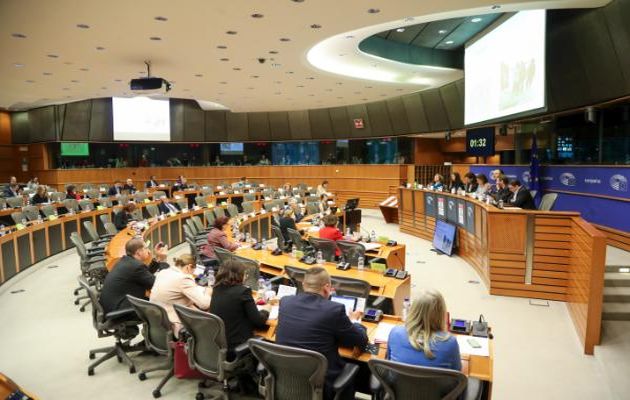The Special Committee on Terrorism proposes to “ban and remove all religious literature within their territory that incites to violent and terrorist acts”,
 The EU Special Committee on Terrorism during its meeting. EU Parliament.
The EU Special Committee on Terrorism during its meeting. EU Parliament.
In the recent years, the EU faced an unprecedented wave of terrorist attacks on its soil, which have brought the issue of security to the forefront of citizens' concerns.
That is why the European Parliament set up a Special Committee on Terrorism (TERR), in its plenary assembly on 6 July 2017, to consult with and hear statements from the main actors involved in the EU institutions and national experts on counter-terrorism, in all areas of activity.
RECOMMENDATIONS TO STOP TERRORISM
A draft report on “Findings and recommendations of the Special Committee on Terrorism” was presented during the TERR extraordinary meeting in Strasbourg on 5 July. The presentation was followed by an exchange of views with Members.
According to the TERR, it aims “to address the practical and legislative deficiencies in the fight against terrorism and to make recommendations as to measures and initiatives that can be taken to overcome these deficiencies”.
“ANTICIPATE THE THREAT”
The text is the result of ten months of work by the members of this commission, who belived that terrorism across Europe can only be addressed by preventing radicalization, acting against hate speech, enhancing cooperation, data exchange and giving strong support to victims of terrorism.
Concrete proposals on such priorities can be found in the more than 140 recommendations of the TERR report.
“The terrorist threat posed by Daesh, Al-Qaeda and other terrorist groups requires well-coordinated, elaborate and robust answers. The EU must be able to anticipate and react swiftly to constantly evolving threats”, Monika Hohlmeier MEP, co-author of the report, said.
The MEPs “have pushed forward several recommendations in order for the European Union and its member states to step up awareness, preparedness and resilience to terrorist threats”, she added.
CLOSURE OF MOSQUES
One of the key points to stop the possible penetration of terrorism in Europe is to stop those who, using Islam, promotes violence.
That is why they urged the Member States “to close without delay mosques and places of worship and ban associations that do not adhere to EU values and incite to terrorist offences, hatred, discrimination or violence”.
HATE SPEECH
They also asked them “to conduct prior screenings of chaplains and to consistently blacklist any hate preachers; introducing them in a EU watch list,so as to better exchange information on radical chaplains”.
The report recommends “to implement the CT Directive under which incitement to commit a terrorist act is a criminal offence, in order to exclude hate preachers from public activity using all legal measures, including refusal of visas or expulsion from EU territory”.
The Committee believes that Member States should “ban and remove all religious literature within their territory that incites to violent and terrorist acts”.
Additionally, they should also remove it “from online platforms and shops as part of the referrals by the Internet Referral Unit”, and “create an online European platform that citizens can use in order to flag terrorist and extremist content online”.
PREVENTING RADICALISATION
The MEPs called for “the creation of an EU ‘Centre of Excellence for Preventing Radicalisation (CoE PR)’, to be embedded in the Commission with adequate financial and human resources”.
“Its tasks should include coordination of funding, and facilitation of cooperation among Member States, policymakers, practitioners, experts and researchers in the area of preventing and countering radicalisation, exchange of best practices, lighthouse projects and training, also by partnering with key strategic third countries”, they added.
TERRORIST FINANCING
The report advises to “bring in a traceability certificate for artworks and antiques entering the EU market”, so that they cannot be used to finance terrorism.
They also warned about “the scale of illicit tobacco markets in the EU, the proceeds of which can be used to finance terrorism”.

Las opiniones vertidas por nuestros colaboradores se realizan a nivel personal, pudiendo coincidir o no con la postura de la dirección de Protestante Digital.
Si quieres comentar o